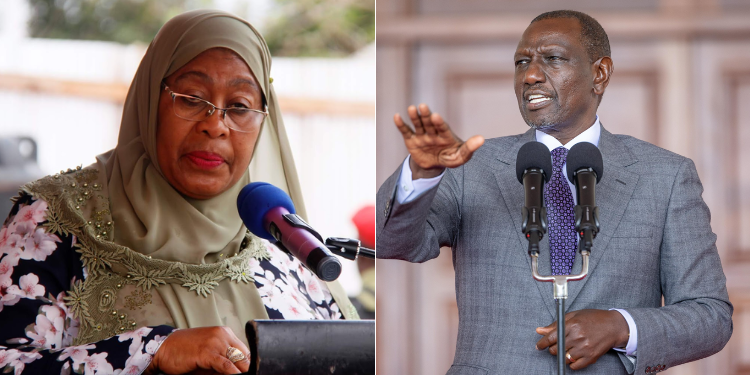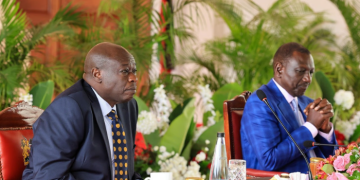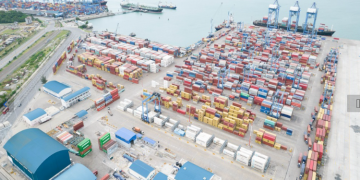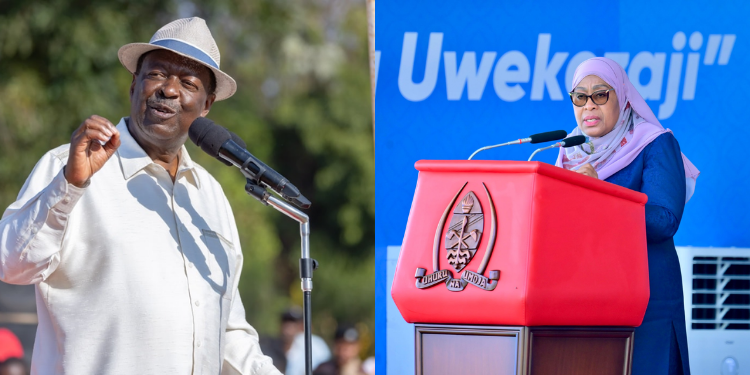The Kenyan government, through Foreign Affairs Cabinet Secretary Musalia Mudavadi, has taken diplomatic steps following Tanzania’s recent decision to ban Kenyans and other foreign nationals from operating in 15 business sectors.
In a statement issued on August 7, 2025, Mudavadi warned that Kenyans already running licensed businesses in Tanzania risk incurring losses of up to Ksh 19 million.
“The Tanzania Finance Act, 2025, introduced discriminatory excise duties on imported products, whereas similar locally made products are exempt. These excise duties affect 25 categories of goods transferred from Kenya to Tanzania,” read part of the statement.
The directive, outlined in Government Notice No. 487A dated July 28, 2025, further states that Tanzanian authorities will no longer issue or renew business licenses for foreigners operating in the specified sectors.
Mudavadi outlined several measures the Kenyan government is taking in response:
- Kenya has formally informed the East African Community (EAC) Secretariat of the violations and requested a regional meeting of ministers responsible for finance, trade, investment, and economic affairs to address both tariff and non-tariff barriers imposed by partner states.
- The Ministry of Foreign and Diaspora Affairs will initiate bilateral talks with the United Republic of Tanzania to seek a resolution that protects Kenyan interests.
- Through the High Commission in Dar es Salaam, the ministry will assess the potential economic impact on Kenyan businesses currently operating in Tanzania.
- The Ministry of EAC Affairs will engage regional counterparts and the EAC Secretariat to seek redress in line with the Treaty for the Establishment of the East African Community, its protocols, and associated laws.
Also Read: Kenya Warns Tanzania After Ban on Foreigners Operating Small Businesses
Mudavadi Explains the Tanzania Business Pass
The United Republic of Tanzania (URT) imposes a Business Pass/Special Pass fee of approximately Ksh 12,000(USD 100) on Kenyan businesspeople for every entry into Tanzania.
These charges also apply to temporary/seasonal workers, and low- to semi-skilled workers, including truck drivers.
In contrast, Kenya offers free business permits to EAC partner states in accordance with the EAC Common Market Protocol.
“These charges are grounded in the Non-citizen (Employment Regulation) Act, 2015 of Tanzania. Since its enactment, Tanzania has been charging Kenyan businesspeople and truck drivers USD 250–500 per entry,” read part of the statement.
“The USD 100 Business Pass fee for East Africans also applies to truck drivers, increasing transportation costs and disrupting the free movement of Kenyans into Tanzania. This forces Kenyan businesses to hire Tanzanian trucks, thereby increasing costs and reducing competitiveness in the Tanzanian market.”
Additionally, the CS stated that Kenya raised the issue at EAC policy organs, which advised bilateral resolution.
Also Read: Tanzania Bans Kenyans from Running Select Businesses (FULL LIST)
Industrial Development Levy
The Tanzania Finance Act, 2025, introduced an Industrial Development Levy, imposing charges ranging between 5% and 15% on imported products.
“The Act specifies that EAC Partner States are not exempt from the levy. A total of 64 tariff lines of products transferred from Kenya to Tanzania are affected,” read part of the statement.
According to the Mudavadi, in contrast, Kenya introduced a similar levy in 2023, but chose to exempt products originating from EAC Partner States, in line with regional trade integration efforts.
Kenya has urged Tanzania to grant Kenyan products national treatment by applying the same excise duty imposed on similar domestic products originating in Tanzania.
Follow our WhatsApp Channel and X Account for real-time news updates.

Photo: PCS / Ikulu ya Tanzania



















































![Senator Allan Chesang And Chanelle Kittony Wed In A Colourful Ceremony [Photos] Trans Nzoia Senator Allan Chesang With Channelle Kittony/Oscar Sudi]( https://thekenyatimescdn-ese7d3e7ghdnbfa9.z01.azurefd.net/prodimages/uploads/2025/11/Trans-Nzoia-Senator-Allan-Chesang-with-Channelle-KittonyOscar-Sudi-360x180.png)























Kenya should retaliate and ban products from Tz as well as businesses from that place! It’s so disappointing, more so coming from a woman led govt…anyway, she even tortures foreigners and throw them out… So inhuman.
Tanzania fears persistent cult of corruption in Kenya!
Mudavadi is a coward, or should i say Kenya is displaying cowardice. Reciprocate. Kick the Tanzanians out of small businesses including corn roasting kwa mitaa, Charcoal selling, belts and other paraphenalias, Gikomba which is 75% Chagas ( don’t care hata kama ni mashemeji zangu) touting and transportation etc. Let be a proper diplomatic spart. That’s the only language a village bully understands.
Tanzania 🇹🇿 is more corrupt than Kenyans. Any other stupid against Kenyans is an ignorance expose’
The step taken by Tanzania government to ban Kenyans from running select businesses will impact negatively on the gains of East African Community.
For years Ke. was bullish on all fronts and its citizens were unashamed of displaying how horribly they’d been brainwashed by the colonial master. Kenyans imagined, that because they used english (language) officially and widely, they were better than their southern neighbours. It’s now dawning on them, that Tz. belongs to a different league. One on much higher level. The giant was merely sleeping. The difference is there for everyone with an interest to ovserve.